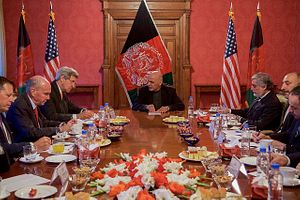Afghanistan’s core defense and intelligence ministries remain headless more than 19 months after Ashraf Ghani was sworn in as president and Abdullah Abdullah took up the newly created post of chief executive in September 2014. Their National Unity Government (NUG) was a grand bargain of sorts cobbled together with the help of U.S. Secretary of State John Kerry. The Guardian called 2015 “a bad year for Ghani” and characterized his relationship with Abdullah as “uneasy.”
That uneasy relationship has fed into gridlock, especially when it comes to bringing on a defense minister. Several candidates have been offered up, but none have gained parliamentary approval. The last NDS chief Rahmatullah Nabil, resigned suddenly in December, in protest of Ghani’s flirtations with Pakistan.
In late April, Ghani gave a strident speech in response to the April 19 attack on an NDS site in central Kabul which killed 64 and injured more than 340. He again pointed the finger at Pakistan for the Taliban’s persistence–another nail in the coffin of Ghani’s once-hoped detente with Pakistan. Ghani also promised to introduce nominees for the defense minister and NDS chief positions.
But those nominees aren’t forthcoming. Instead, as TOLOnews reported today, Masoom Stanekzai–who has served as acting defense minister since last summer when parliament rejected his nomination for the post–will be shifted to become caretaker of NDS. Meanwhile, Lieutenant General Abdullah Khan–previously the chief of staff of the defense ministry–has been made acting defense minister.
The enormity of the security challenges facing Afghanistan necessitate more than simply “acting” heads. As Jawad Sukhanyar and Mujib Mashal note in an article for the Washington Post in early April following Secretary of State Kerry’s first visit to Afghanistan since 2014, bickering between Ghani and Abdullah has had severe impacts on making political appointments to several ministries, not just defense and intelligence:
After months of limbo, a new interior minister was finally approved by Parliament on Saturday [April 9], while the two leaders continue to disagree over the choice for a new intelligence chief. On the same day that the interior minister was confirmed, the government also finally got its first attorney general — after the post had been vacant for a year and half.
Meanwhile, the process to formalize Abdullah’s post–transitioning the chief executive job into a prime minister position–has also stalled. As Philip Reeves comments in a piece for NPR today, the terms of the power-sharing NUG agreement, “include a commitment to hold a loya jirga, a grand assembly of Afghan elders, within two years to debate amending the constitution and turning the post of CEO into prime minister.” But the deadline runs out in five months and “Few Afghan experts believe there’s much chance of a loya jirga being held within that time.”
Afghanistan’s government has enough holes–budget shortfalls, virulent corruption, lack of capacity–which are hardly managed well with the top spots sitting empty. Caretaker ministers can only do so much, ultimately they need the legitimacy conferred by parliamentary approval to do their jobs fully. And Afghanistan certainly needs them to.

































